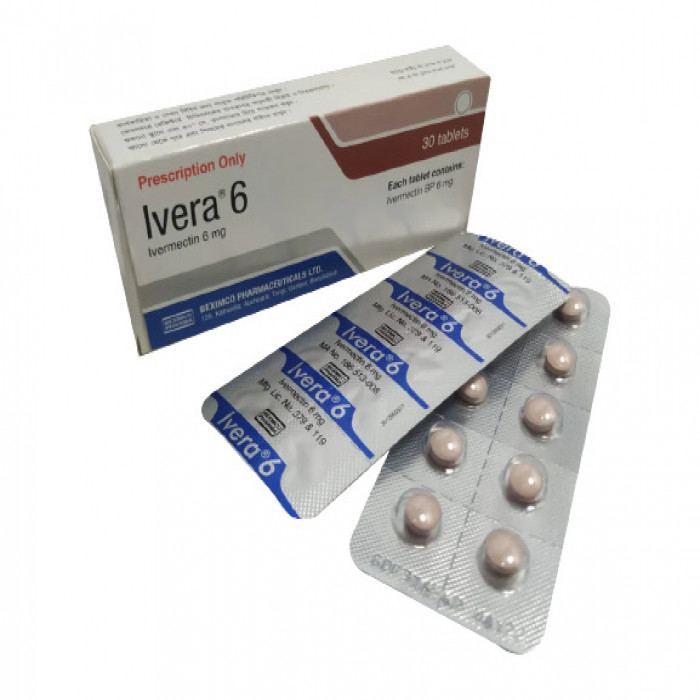
✔ 100% Authentic Product
👁️ Currently Viewing 1938
Ivera 6mg 10pcs
Generic Name: Ivermectin 6mg
Manufacturer/Distributor: Beximco Pharmaceuticals Ltd.
Discount
Price: ৳ 146
MRP:
৳
150
3%
Off

100% Genuine Products, Guaranteed

Safe & Secure Payments, Always

Fast, Secure & Efficient Delivery

Proper Packaging
 Cash on Delivery - All over Bangladesh
Cash on Delivery - All over Bangladesh Regular Delivery - 12-24 Hours, Dhaka City* Charge Tk.39-59
Regular Delivery - 12-24 Hours, Dhaka City* Charge Tk.39-59 Regular Delivery - 24-48 Hours, Other Cities* Charge Tk.99-110
Regular Delivery - 24-48 Hours, Other Cities* Charge Tk.99-110
 ফ্রি ডেলিভারিঃ - ৯৯৯ টাকা+ অর্ডারে, ঢাকা
শহরে
ফ্রি ডেলিভারিঃ - ৯৯৯ টাকা+ অর্ডারে, ঢাকা
শহরে ফ্রি ডেলিভারিঃ - ২৯৯৯ টাকা+ অর্ডারে, ঢাকার
বাহিরে
ফ্রি ডেলিভারিঃ - ২৯৯৯ টাকা+ অর্ডারে, ঢাকার
বাহিরে
100% Genuine Products, Guaranteed
Safe & Secure Payments, Always
Fast, Secure & Efficient Delivery
Proper Packaging
 Cash on Delivery - All over Bangladesh
Cash on Delivery - All over Bangladesh Regular Delivery - 12-24 Hours, Dhaka City* Charge Tk.39-59
Regular Delivery - 12-24 Hours, Dhaka City* Charge Tk.39-59 Regular Delivery - 24-48 Hours, Other Cities* Charge Tk.99-110
Regular Delivery - 24-48 Hours, Other Cities* Charge Tk.99-110 ফ্রি ডেলিভারিঃ - ৯৯৯ টাকা+ অর্ডারে, ঢাকা
শহরে
ফ্রি ডেলিভারিঃ - ৯৯৯ টাকা+ অর্ডারে, ঢাকা
শহরে ফ্রি ডেলিভারিঃ - ২৯৯৯ টাকা+ অর্ডারে, ঢাকার
বাহিরে
ফ্রি ডেলিভারিঃ - ২৯৯৯ টাকা+ অর্ডারে, ঢাকার
বাহিরে
✅ Description:
Indications
Strongyloidiasis of the intestinal tract: Ivermectin is indicated for the treatment of intestinal (i.e., nondisseminated) strongyloidiasis due to the nematode parasite Strongyloides stercoralis. This indication is based on clinical studies of both comparative and open-label designs, in which 64-100% of infected patients were cured following a single 200-mcg/kg dose of ivermectin.
Onchocerciasis: Ivermectin is indicated for the treatment of onchocerciasis due to the nematode parasite Onchocerca volvulus. This indication is based on randomized, double-blind, placebo-controlled, and comparative studies conducted on 1427 patients in onchocerciasis-endemic areas of West Africa. The comparative studies used diethylcarbamazine citrate (DEC-C).
Pharmacology
Ivermectin selectively binds and with high affinity to glutamate-gated chloride ion channels, which occur in invertebrate nerve and muscle cells leading to an increase in the permeability of cell membranes to chloride ions with hyperpolarization of the nerve or muscle cell and, ultimately, death of the parasite.
Dosage & Administration
Adult & Elderly: One tablet a day before or after a meal (food-independent absorption) or as directed by the physician. In more severe cases, two tablets a day may be required as prescribed by the physician.
Pediatric patients: Safety and effectiveness in pediatric patients have not been established.
Interaction
Post-marketing reports of increased INR (International Normalized Ratio) have been rarely reported when ivermectin was co-administered with warfarin.
Contraindications
It is contraindicated in patients who are hypersensitive to any component of this product.
Side Effects
Strongyloidiasis: In four clinical studies involving a total of 109 patients given either one or two doses of 170 to 200 mcg/kg of Ivermectin, the following adverse reactions were reported as possibly, probably, or definitely related to Ivermectin.
Body as a whole: asthenia/fatigue (0.9%), abdominal pain (0.9%)
Gastrointestinal: anorexia (0.9%), constipation (0.9%), diarrhea (1.8%), nausea (1.8%), vomiting (0.9%) Nervous System/Psychiatric: dizziness (2.8%), somnolence (0.9%), vertigo (0.9%), tremor (0.9%)
Skin: pruritus (2.8%), rash (0.9%), and urticaria (0.9%).
Pregnancy & Lactation
Pregnancy Classification C. Ivera 6 does not appear to be fetotoxic to a growing fetus in any way. However, no suitable and well-controlled studies on pregnant women have been conducted. Because the safety of ivermectin in pregnancy has not been proven, it should not be used during pregnancy.
Ivera 6 is excreted in low amounts in human milk by nursing mothers. Treatment of lactating mothers should be conducted only when the danger of delayed treatment to the mother surpasses the potential risk to the newborn.
Precautions & Warnings
Microfilaricidal medicines, such as diethylcarbamazine citrate (DEC-C), have been documented in the past to elicit cutaneous and/or systemic reactions of different severity (the Mazzotti reaction) as well as ophthalmological reactions in onchocerciasis patients. These reactions are most likely allergic and inflammatory responses to microfilariae death. These events may occur in patients treated with Ivermectin for onchocerciasis, in addition to clinical adverse effects that are maybe, probably, or definitely connected to the medicine. There haven't been any controlled clinical trials on the treatment of severe Mazzotti responses.
Storage Conditions
Do not store at temperatures above 30°C. Keep out of children's reach.
⚠️Disclaimer:
At ePharma, we’re committed to providing accurate and accessible health information. However, all content is intended for informational purposes only and should not replace medical advice from a qualified physician. Please consult your healthcare provider for personalized guidance. We aim to support, not substitute, the doctor-patient relationship.






